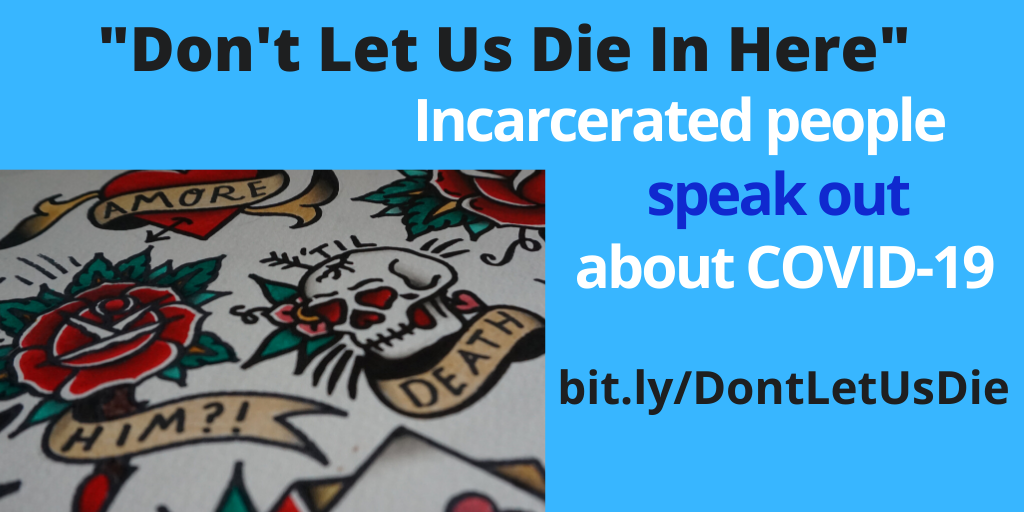Read on for quotes from Americans and immigrants living in jails during the COVID-19 crisis. A common theme is feeling that they are being left to die. Doctors and family members have also called for their release. #FreeThemAll4PublicHealth
Download the document here: In Their Own Words_April 2020
In Their Own Words
Incarcerated People Talk About COVID-19
“Don’t let us die like this”
Florida
Immigration detainee at Krome Detention Center: ”They have us in here indefinitely, putting our health at risk. We have our families in this country very worried about our health. The guards are also worried about being infected and may not want to be coming to work but they do not have a choice.”
Louisiana
Daimy Garcia, asylum seeker at South Louisiana Center: ”This is a ticking time bomb.”
Asylum seeker, speaking to an advocate: ”Please help me get out, I don’t want to die in here. Things are terrible. People are sick. We don’t know if it’s coronavirus.”
Ana, Dominican immigrant at Jena detention facility: ”Give us an opportunity to be with our families. We’re mothers. Don’t let us die like this, as if we were animals. We’re human beings.”
Arlet Victoria Remón Pérez, asylum seeker at Jena detention facility: ”We’re scared because we know we can die inside here. The situation does not bode well for us. We don’t have a way to protect ourselves. We feel like children who are protected by parents. They are in charge of protecting us — and they are not protecting us.”
Eliana Hecheverría, asylum seeker at Jena detention facility: ”I don’t feel like the owner of my own life here, because here, I’m completely at risk. Outside, I know how to take care of myself, I know how to protect myself, I know what I have to do to not get infected. Here, I don’t.”
Marlene Seo, immigration detainee at Jena detention facility: ”If our congressmen and everybody, even the president, is talking about humanity, and us keeping together and doing the best that we can to help each other, why are we not being treated in that sense? People keep coming in and out. They’ll deport people. And they’ll take them out and they’ll bring them back within a week because there are no flights. Everything that applies to everyone on the outside doesn’t apply to us in here. We are allowed to be 80 [people] grouped together, sneezing, coughing.”
Kenni, asylum seeker at Jena detention facility: ”It’s been seven months of imprisonment without having committed any crime.”
New York
Inmate, incarcerated at Franklin Correctional Facility in Malone: “Take one day at a time and try your best [to] stay away from people. The best thing to do is isolate yourself.”
Ohio
Anonymous immigration detainee (as told to a lawyer): “Here everything is the same [as before COVID-19]. They have not spoken to us about the virus. Soap? We are only given two small bottles, there is nothing to wash dishes with. Where we wash dishes is where we wash our hands, and we have to use our own personal things to clean the bathrooms. There is a lot of racism here, the officials insult us and they don’t use masks, we’re here exposed to whatever disease and if one is sick, everyone inside is at risk. There is no form of prevention here inside. It’s ugly what we’re living through here, to be honest, and I don’t know why, because we are people just like them.”
Inmate, incarcerated at Elkton Federal Prison: “Shit just got real, I’m not really feeling too good mentally. It almost feels like they’re punishing us for being sick.”
Nico-Las Phanthavong, incarcerated at Marion Correctional Institution: “Mom, I’m never getting out of here. They’re going to make me do the rest of my time in here and it’s [COVID-19] in here.”
Tom Owens, incarcerated at Richland Correctional Institution in Ottawa County: “This place is completely filled to the maximum. Our beds are 3 feet apart. There’s no way to be 6 feet apart. Once [coronavirus] comes in here, it’s going to hit 30% of the population. There’s enough low-level people in here, you could reduce the population fairly rapidly.”
Inmate, incarcerated at Pickaway Correctional Institute: “Nobody knows this is happening to us. People are passing out in my unit everyday…. They are still cramming tons of inmates in small closed in rooms up here for meetings that mean nothing. This is how it’s spreading so quickly up here. You gotta get in touch with somebody to let them know what’s going on in here. These people have no voice.”
Aaron DeShawn Campbell, incarcerated at Elkton Federal Prison: “They are literally leaving us in here to die. They got this shit called compassionate release. But they ain’t gonna let me out because they ain’t gonna make no money.”
Oregon
Anonymous inmate at Columbia River Correctional Institution: “When it comes to the general feeling of people in here…. there is a large population that has come to terms with the fact that they may die in prison.”
Steven Stroud, inmate at Columbia River Correctional Institution: “I’m lucky that I see my doctor once a week. But, essentially what she’s telling me is ‘Wash your hands.’ She has no real answers. That’s the thing, none of the medical professionals here are giving us truthful answers about the severity of this. We’re not stupid—I know the public has a different perception—but we’re pretty bright people. We know when we’re being lied to. We know when people are placating us. People deserve to be treated compassionately, including us.”

